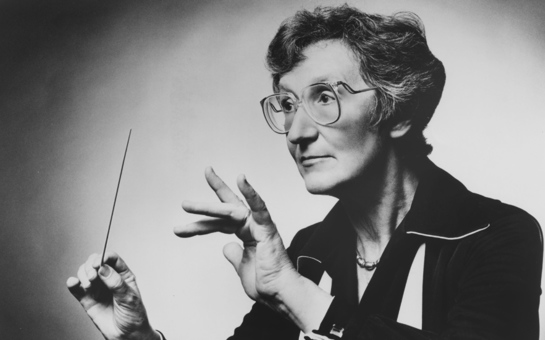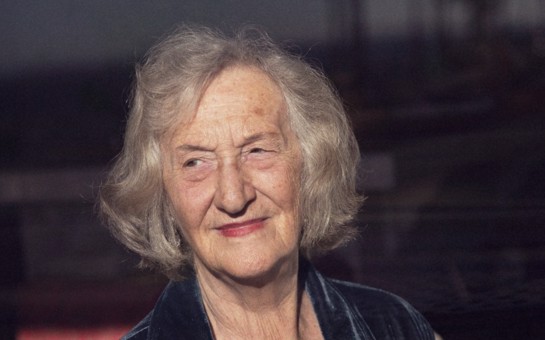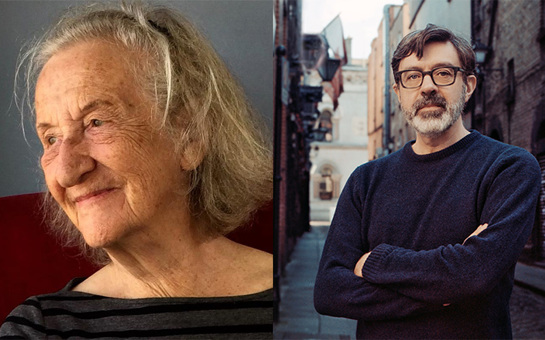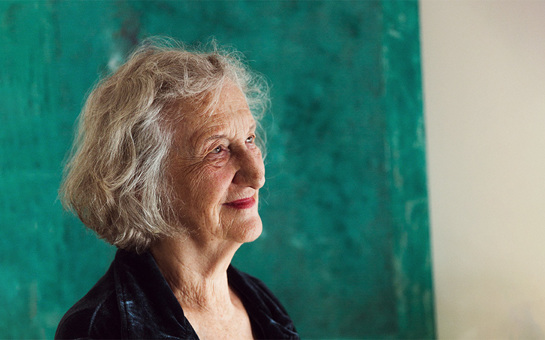As Thea Musgrave writes her eleventh opera, meanwhile the reputation of her existing works grows ever wider and more international. Beginning this Winter, several of her defining orchestral works will receive performances in Europe and the US, including the world premiere of a new orchestral version of Piccolo Play.
Songs for a Winter’s Evening (1995)
16 December 2021
Claire Booth, soprano & BBC Philharmonic | Media City, Salford, UK - book tickets
27 January 2022
Norrlandsoperans Symfoniorkester | Norrlandsoperan, Umeå, Sweden
Two wintery programmes this season open with Musgrave’s orchestral song cycle, Songs for a Winter’s Evening. Musgrave carefully chose the poems with a view to creating a song cycle describing the ‘events’ in the life of a woman, from the flirtatious young girl to the young woman betrayed, to her eventual fulfilment in the mature love which has lasted for many years. One of Musgrave’s finest orchestrations, she takes inspiration from the original tunes of the Burns poems, whilst interspersing the more modern and popular tunes among the orchestra. The songs themselves are assured mix of fast and slow, lament and humour and overall power.
Claire Booth performs them with the BBC Philharmonic, who hosted a focus on Musgrave’s work in 2018. Whilst Norrlandsopera's performance is one of many recent inclusions of the composer’s work following the Stockholm International Composer Festival three years ago.
Concerto for Orchestra (1967)
3 February 2022
Malmø Symfoniorkester | Konserthus, Malmö, Sweden - book tickets
Malmö Symphony Orchestra perform Musgrave’s 1967 Concerto for Orchestra in a programme of Mozart, Korngold and Grace Williams. The concerto is one of a series of works (including the 2nd and 3rd Chamber Concertos), in which the composer has been preoccupied with the search for 'vivid dramatic forms for abstract instrumental music', this being the first full orchestra work to take on the idea. This has led her to explore the possibilities for freeing the vertical aspect of the music from the rigid control of the barline - or, in this case, from the conductor’s beat - without losing control of the overall musical content, so that, whatever the arbitrary melodic coincidence, the harmonic sense is always clear. Besides being a virtuoso work for orchestra, this is also a ‘concerto’ in the more usual sense of a conflict between solo and tutti. This conflict is muted at first, becoming more intense as the tempo increases throughout the work, and ending with a fierce musical confrontation.
Perhaps the greatest conflict however is that between the soloists and conductor themselves. Taken directly from a dream the composer had the day before the commission request arrived on her doorstep, in the third movement the clarinet jumps out of the ranks of the orchestra and calls other players to defy ensemble playing led by the conductor. This sparked the idea that permeates a long line of orchestral works were dramatic, movement elements are incorporated into the orchestral playing to further enhance the theatre and drama of the concert experience – something now taken up by more and more composers. One can see them also in Night Music (1969), the Horn Concerto (1971), Viola Concerto (1973), The Voices of Our Ancestors (2014), From Darkness into the Light (2017) and the Trumpet Concerto (2019).
Turbulent Landscapes (2003)
19-22 March 2022
Symphony Pro Musica | 2 concerts - Worcester (MA), USA - more info
Symphony Pro Musica of Worcester, Massachusetts give the third US outing of Musgrave’s orchestral suite Turbulent Landscapes, originally commissioned by the Boston Symphony Orchestra. One of Musgrave’s largest works for orchestra, the turbulent landscapes are taken from selected painting by J M W Turner: ‘Sunrise with Sea Monsters’; ‘The Shipwreck’, ‘Snow Storm: Hannibal and his Army crossing the Alps’; ‘War. The Exile and the Rock Limpet’; ‘16th October, 1834. The Burning of the Houses of Parliament’; ‘Sunrise, with a Boat between Headlands’. The orchestration bubbles with tuba sea monsters, heroic horns, fizzes with woodwind snowstorms and blazes of fire, deploying its full forces to capture Turner’s impressionistic seascapes.
Song of the Enchanter (1990)
13-14 May 2022
Royal Scottish National Orchestra | 2 concerts – Edinburgh/Glasgow, UK - book tickets
19-21 May 2022
North Carolina Symphony | 4 concerts - Meymandi Concert Hall, Raleigh (NC), USA - book tickets
5 June 2022
Brookline Symphony Orchestra | Brookline (MA), USA
The size, drama and lyricism of Musgrave’s orchestral writing has often made her works well-suited partners to the big late-romantic works and not least, Sibelius. Following of from four performances of her 1990 concerto opener Song of the Enchanter by The Halle in November, come seven further performances with the Royal Scottish National Orchestra, the North Carolina Symphony Orchestra and Brookline Symphony, Massachusetts.
This short work, written in the winter and spring of 1990, was commissioned by the Helsinki Philharmonic Orchestra to honour the 125th anniversary of Sibelius' birth. It is based on an episode from the Kalevala, the great Finnish epic, where Väinämäinen, the hero-God, has fashioned a magical five-stringed instrument from the bones of a giant pike. Orpheus-like, he plays upon it and enchants the people.
The Seasons (1988)
18 June 2022
Riga Sinfonietta | The Great Hall, University of Latvia - more info
The Riga Sinfonietta open a concert of Scottish and Scots-inspired music, rescheduled due to COVID restrictions, with a movement from Musgrave’s take on The Seasons. Closely related to Turbulent Landscapes, this work marked a move into a more lyrical and warm style of orchestration, incomparision to her works of the 70s and early 80s. The first movement, Autumn, violent and destructive, stands for an impending storm, be it literal or metaphorical. One of the main musical motives includes hunting horns set against a restless background. They are eventually swallowed up by a violent tempest. In mourning, bells ring out the Dies Irae. Each movement is inspired by works found at the Metropolitan Museum of Art in New York; here the mood is depicted by Picasso’s ‘The End of the Road’.
Piccolo Play (version for piccolo and strings) (1990)
13 August 2022
Jennifer Gunn, piccolo and the Chicago Philharmonic (World Premiere Performance)
A new string-orchestra version of Musgrave’s 1989 of suite piccolo short-works concludes the seasons with the Chicago Philharmonic and soloist Jennifer Gunn, conducted by Leonard Slatkin. This orchestral version of Piccolo Play was commissioned by the National Flute Association in celebration of its 50th anniversary, made possible with generous donations from private commissioners James Keefe and Janet Kinmonth of Keefe Piccolos, Burkart Flutes and Piccolos, and Chair of the NFA Piccolo Committee, Laurie Sokoloff.
Piccolo Play is inspired by the harpsichord pieces of Couperin (L’Enchanteresse, L’Amphibie, La Pateline, Les Papillons, Le Reveil-matin, Le Bruit de Guerre, Le Turbulent) – the piccolo playing the protagonist in each case. For example, in L’Amphibie the strings represent the pool on which the frog leaps from leaf to leaf, disturbing the water as he goes. In Le Reveil-matin, the strings are the ones who sleep whilst the piccolo is the alarm clock who forces them to wake. Full of charming character, this regularly-performed chamber work now has a new life in the main concert hall.





